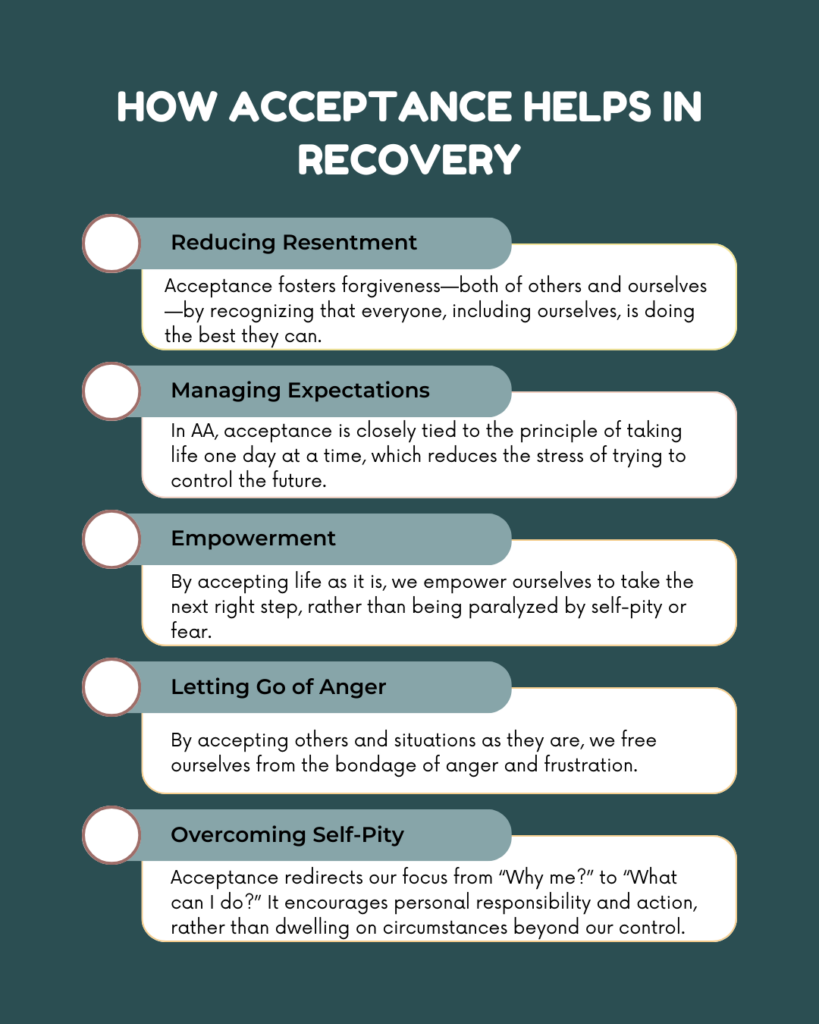Acceptance is a powerful concept in the realm of personal growth and recovery. It involves acknowledging and embracing our current circumstances, emotions, and challenges rather than resisting or denying them. The phrase “Acceptance is the answer to all my problems” encapsulates a profound truth about finding peace and resolution in our lives.
Understanding Acceptance

What Is Acceptance?
Acceptance involves recognizing and coming to terms with reality as it is, without trying to change or fight against it. It means acknowledging your feelings, situations, and experiences without judgment or resistance. This approach contrasts with denial or avoidance, where we may struggle to come to grips with our circumstances.
Why Acceptance Matters
Acceptance is crucial for mental well-being and personal growth. It helps us let go of the struggle against what we cannot change, allowing us to focus on what we can control. By accepting reality, we reduce internal conflict and create space for healing, growth, and positive change.
The Role of Acceptance in Recovery
Acceptance is a crucial part of recovery because…
Acceptance and Emotional Healing
In the context of addiction recovery, acceptance plays a pivotal role. Many individuals in recovery struggle with feelings of guilt, shame, or resentment. Embracing acceptance can help alleviate these negative emotions by allowing individuals to acknowledge their past experiences without letting them define their future.
Acceptance and Self-Compassion
Acceptance fosters self-compassion by encouraging individuals to treat themselves with kindness and understanding. Instead of harsh self-criticism, acceptance promotes a gentler approach to personal shortcomings and challenges. This compassionate stance can support emotional healing and resilience.
Acceptance and Change
Paradoxically, acceptance often leads to change. When we accept our current situation, we become more open to making meaningful changes. By acknowledging where we are, we can identify areas for growth and take proactive steps toward improvement.
The Benefits of Embracing Acceptance
Reduces Stress and Anxiety
Resistance to reality can create significant stress and anxiety. When we fight against our circumstances, we expend energy on what cannot be changed. Acceptance helps reduce this strain by allowing us to focus on managing our reactions and finding solutions within our control.
Enhances Emotional Resilience
Acceptance builds emotional resilience by encouraging a balanced perspective on life’s challenges. It helps us remain grounded and adaptable, even in the face of adversity. This resilience fosters a sense of inner strength and stability.
Improves Relationships
By accepting ourselves and others, we foster healthier relationships. Acceptance encourages empathy and understanding, reducing judgment and criticism. This approach enhances communication and connection, leading to more supportive and fulfilling interactions.
Promotes Personal Growth
Acceptance is a catalyst for personal growth. It allows us to recognize and embrace our strengths and weaknesses, providing a clear foundation for self-improvement. Through acceptance, we can identify areas for development and set realistic goals for personal advancement.
Practical Steps to Embrace Acceptance
1. Acknowledge Your Feelings
The first step in acceptance is to recognize and validate your emotions. Allow yourself to feel and process your emotions without judgment. Acknowledging your feelings is essential for moving toward acceptance and understanding.
2. Practice Mindfulness
Mindfulness involves staying present and observing your thoughts and feelings without attachment. This practice helps you accept your experiences as they are, reducing the tendency to resist or avoid them.
3. Reframe Your Perspective
Change your perspective by focusing on what you can control rather than what you cannot. Reframing your thoughts helps shift your mindset from resistance to acceptance, allowing you to approach challenges with a more balanced outlook.
4. Seek Support
Acceptance can be challenging to achieve alone. Seek support from friends, family, or mental health professionals who can offer guidance and encouragement. Supportive relationships can help you navigate the process of acceptance and provide valuable insights.
5. Set Realistic Goals
Setting achievable goals can help you move forward with acceptance. By identifying specific, realistic objectives, you can focus on making positive changes while accepting your current situation.
6. Practice Self-Compassion
Be kind to yourself throughout the process of acceptance. Recognize that growth and change take time, and treat yourself with patience and understanding. Self-compassion supports a positive and accepting mindset.
Conclusion
Acceptance is a profound and transformative concept that can lead to significant personal growth and emotional well-being. By embracing acceptance, you can reduce stress, build resilience, improve relationships, and foster personal development. If you’re seeking additional support on your journey toward acceptance and recovery, consider exploring Aligned Living. Aligned Living is a virtual mental health and drug rehab aftercare program designed to provide ongoing support and guidance. Our program offers tailored services to help you build a solid foundation for lasting recovery and personal growth. Reach out to Aligned Living today to learn more and take the next step toward a more accepting and fulfilling life.

